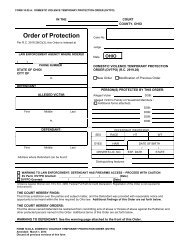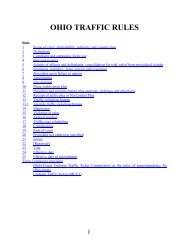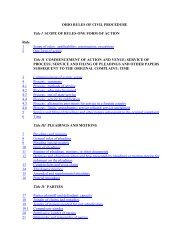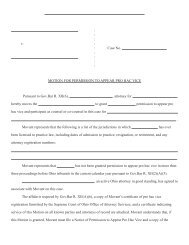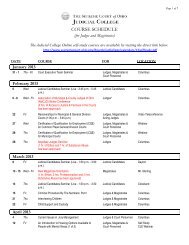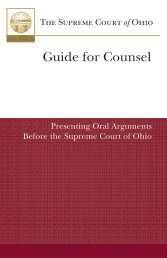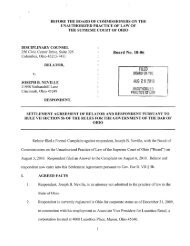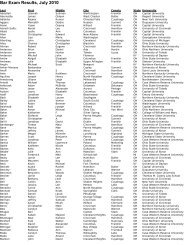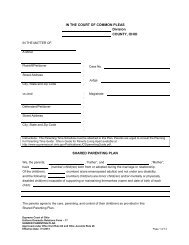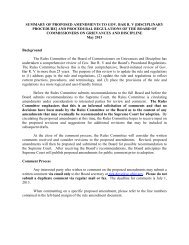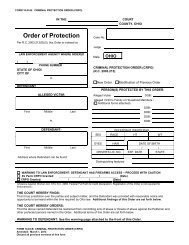disciplinary handbook: volume v - Supreme Court - State of Ohio
disciplinary handbook: volume v - Supreme Court - State of Ohio
disciplinary handbook: volume v - Supreme Court - State of Ohio
Create successful ePaper yourself
Turn your PDF publications into a flip-book with our unique Google optimized e-Paper software.
Freeman, Cleveland Metro. Bar Assn. v.128 <strong>Ohio</strong> St.3d 416, 2011-<strong>Ohio</strong>-1447. Decided 3/31/2011.Case Summaries- 90In 2002, respondent previously received a public reprimand for neglecting a client‘s case, handlinganother case without adequate preparation, and initially failing to cooperate in the <strong>disciplinary</strong>investigation. Here, respondent neglected two foreclosure matters and failed to keep his clientsreasonably informed <strong>of</strong> the status <strong>of</strong> their matters. The matter was deemed to have been submitted inwriting without a hearing pursuant to BCGD Proc.Reg. 3(C). In Count One, respondent was retainedby a husband and wife to help resolve an issue with a mortgage lender. When the lender filed aforeclosure action, respondent failed to file a timely answer or move for an extension until the bank fileda motion for default judgment—then respondent filed an objection to the motion and filed an answer.The motion was denied by the court, but the court permitted the late answer. The lender filed anamended complaint, which went unanswered. When the lender filed another motion for defaultjudgment, respondent asserted that he had not been properly served and obtained leave to file an answer tothe amended complaint. The court again permitted respondent to answer. Respondent failed to timelyrespond to lender‘s discovery requests. The court granted lender‘s motion for those requests foradmission deemed admitted. Respondent failed to appear at the final pretrial hearing, told his clientsthey did not need to attend, and ignored the court‘s order to file trial brief and exhibits. The courtordered that the home in dispute be sold at a sheriff‘s sale. The homeowners obtained new counsel and,although respondent failed to return the client file, the clients were able to work out a payment plan andavoid the sale <strong>of</strong> their home. The panel and board found violations <strong>of</strong> Pr<strong>of</strong>.Cond.R. 1.3, 1.4(a)(2),1.4(a)(3), and 1.4(a)(4), which the court accepted. In Count Two, a couple retained respondent to helpfinance their home and assist in a pending foreclosure action. Respondent filed timely answers to thecomplaint and amended complaint and engaged in discovery. The couple tried to contact respondent inApril 2007 regarding the status <strong>of</strong> their case, but he did not return their calls until May 2007. Respondentalso failed to respond to a motion for summary judgment as he decided, without discussing with theclients, that they had no defense. The panel and board found violations <strong>of</strong> Pr<strong>of</strong>.Cond.R. 1.3, 1.4(a)(4),and 7.3(c)(3). The <strong>Court</strong> adopted the findings <strong>of</strong> Pr<strong>of</strong>.Cond.R. 1.3 and 1.4(a)(4), but dismissed thefinding <strong>of</strong> Pr<strong>of</strong>.Cond.R. 7.3(c)(3) which requires ―ADVERTISING MATERIAL‖ or―ADVERTISEMENT ONLY‖ on solicitation letters . The <strong>Court</strong> noted that respondent had a priorrelationship with the clients in this case, and thus, even though he stipulated to violating Pr<strong>of</strong>.Cond.R.7.3(c)(3), he fit within an exception to the rule and thus did not violate it. See Gov.Bar R. V(6)(J), Reid(1999), and Donlin (1996) (respondent not bound by a stipulation when stipulated facts and evidence athearing demonstrate that conduct did not constitute a violation.) In aggravation, respondent had a prior<strong>disciplinary</strong> record and engaged in multiple <strong>of</strong>fenses. BCGD Proc.Reg. 10(B)(1)(a) and (d). Inmitigation, respondent did not act with a dishonest or selfish motive, and cooperated in the <strong>disciplinary</strong>investigation and <strong>disciplinary</strong> proceeding. BCGD Proc.Reg. 10(B)(2)(b) and (d). Relying on Holda(2010), the parties stipulated to a one year suspension, all stayed on the conditions <strong>of</strong> no furthermisconduct and the completion <strong>of</strong> an additional 12 hours <strong>of</strong> CLE in law-<strong>of</strong>fice management. The paneland board adopted this sanction with an additional condition that 6 hours <strong>of</strong> the CLE be completed withinthe first 6 months <strong>of</strong> the stayed suspension; this was not opposed by either party. The <strong>Court</strong> consideredHolda (2010) and Pfundstein (2010). The court agreed with the board‘s recommended sanction and soordered a one-year suspension, all stayed on conditions <strong>of</strong> completing at least 12 hours law-<strong>of</strong>ficemanagement in addition to at least six hours <strong>of</strong> CLE within the first six months <strong>of</strong> the stayed suspensionand commit no further misconduct.Rules Violated: Pr<strong>of</strong>.Cond.R. 1.3, 1.4(a)(2), 1.4(a)(3), 1.4(a)(4)Aggravation: (a), (d)Mitigation: (b), (d)Prior Discipline: YES Procedure/ Process Issues: YES Criminal Conduct: NOPublic Official: NO Sanction: One-year suspension, stayed



